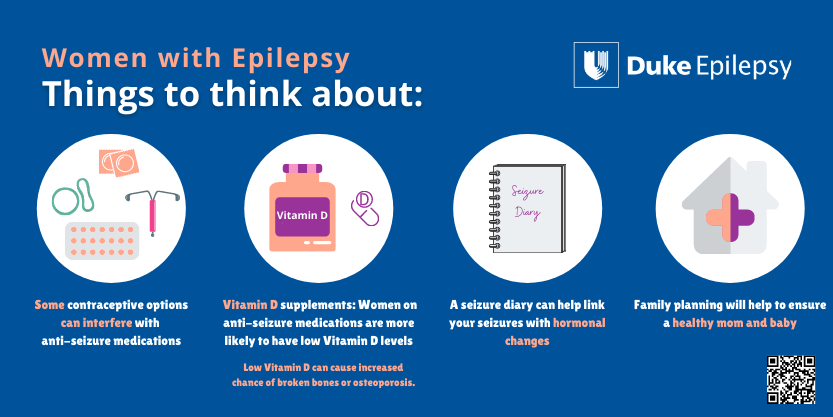We sat down with Dr. Prachi Parikh, our most recent faculty addition to the DCEC, to talk about her passions and some of the unique considerations for women with epilepsy.
Women and Epilepsy

Women with epilepsy have a handful of gender-specific considerations such as birth control, hormone fluctuations, family planning, bone health, and a lot more. Being aware of these unique concerns and talking to your epileptologist and care team about them is important for your health care.

There are a number of anti-seizure medications that can decrease the effectiveness of oral contraceptives, which could lead to accidental pregnancies in person with epilepsy. At the same time, some birth control options can increase the metabolism of certain epilepsy medications, increasing the risk of breakthrough seizures. It is important to talk to your epileptologist about your current birth control regime, whether it is affected by your anti-seizure medications, and what your alternatives birth control options may be.
Learn more about contraceptive options through the Epilepsy Foundation website
Women on anti-seizure medications are more likely to have osteoporosis, which can lead to bone fractures. We are not sure why these medications might cause a decrease in Vitamin D levels, but there are a couple of things women with epilepsy can do to prevent fractures.
Take Vitamin D Supplements
Taking Vitamin D supplements is the easiest way to increase your bodies calcium absorption, which strengthens your bones. Vitamin D supplements can be purchased over the counter at most retail pharmacies
Exercise
Regular exercise, or "weight bearing" activities, increase bone density. High and light impact workouts can achieve this goal!
Learn more about Bone Health on the Epilepsy Foundation website
There are two main hormones that are predominant in women – estrogen and progesterone. These hormones play an important role in ovulation, menstruation, pregnancy and menopause. These hormones also permeate the brain and regulate the brains excitability. Estrogen can increase the brains excitability and progesterone decreases the brains excitability. A fall in progesterone occurs towards the end of the menstrual cycle which is when several women will notice an increase in seizures. Some woman notice an increase right around the time ovulation occurs when estrogen is high. This association of seizures with hormones is called catamenial epilepsy. Maintaining a seizure diary is the best way to help determine if there is a correlation or not.
Learn more about Hormones and Epilepsy on the Epilepsy Foundation Website
Learn more about the Epilepsy Foundation My Seizure Diary application
For women with epilepsy, the safest pregnancies are planned pregnancies. Although the chance of birth defects increases slightly from the use of anti-seizure medications, the risk is still low. Over 90% of pregnancies in women with epilepsy result in a healthy baby. However, it is very important for pregnant persons with epilepsy to visit their epileptologist every trimester to monitor your anti-seizure medication levels.
